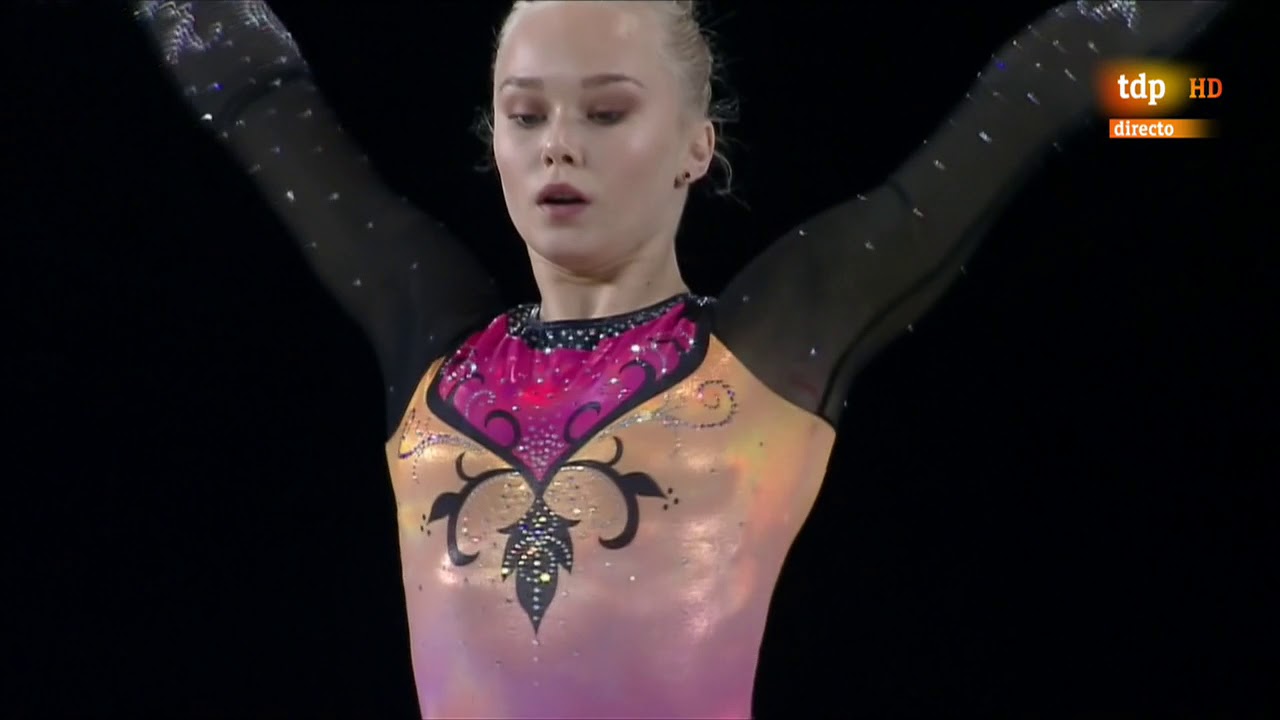Angelina Melnikova gave an interview to RIA Voronezh talking about her experience at Worlds and her plans for the near future.
Q: What are your thoughts on the Canadian Worlds?
A: Generally, I liked everything. I liked the arena – the lights, lots of spectators. But I really didn’t like how I performed. I made two mistakes on floor. I’m happy with my bars, though. But the mistakes on floor ring an alarm for me, I have to work harder.
Q: What will be your next competition?
A: I just asked, there will be one competition in Japan in December, it’s called Toyota Cup. Right now I came to Voronezh just for a day, unfortunately, I won’t be able to see everyone. Then I’m going on vacation and in a week we’re going back to the camp again. We’ll be training. We don’t really have long rest periods.
Q: Does your leg still hurt?
A: It hurts from time to time, I could say that it’s even worse than it was at Worlds. I jumped too much, how gymnasts say. I’ll need to go to a doctor, to get a treatment.
Q: The national team coaches complained about the new rules for the podium training.
A: Yeah, that happened. We were only given 3 minutes per person during the podium training. It used to be 15-20 minutes for the team, so everyone had time to get a feel of the apparatuses. And now it was very hard – new apparatuses, new arena, lighting. All of this affects your performance very much. It’s hard to manage to do everything perfectly on your first try. Podiums differ as well. Sometimes a podium “plays” somewhere and the floor rebounds differently. Or sometimes the vault runway is soft. You’re running and you feel the difference. In order to adapt, you need several tries. But I don’t want to complain about it – everyone was in the same situation.
Q: Would everything be different if not for your injury?
A: Everything was going great in preparation for the competition. I felt that I was in great shape. But the injury crossed everything, ruined everything. It was important for me, though, that I could compete. Yes, I could’ve shown a better result. But I’m happy that I could go and compete with the injury. It was an experience of overcoming, conquering [the injury]. I didn’t give up – it’s an important experience for me. About three days before leaving for Montreal there was a talk on whether it would be better for me to stay home. there were doubts if I would be able to tumble at all. I insisted that I would – I desperately wanted to compete.
Q: A year has passed since the Olympics. Did your life change in any way?
A: No, it didn’t really change. The only change – people started to recognize me on the streets, that’s nice. I feel the support of my fans every day. And if we’re talking about the sport, I feel that I’ve become more experienced. But I haven’t changed inside – I’m the same as before.
Q: Did the popularity wave go down?
A: A bit. But I can’t say that I’m breathing more easily now. Sometimes it’s nice to talk to the fans. Sometimes they send awesome gifts. Someone sent me a huge teddy bear anonymously – it’s more than a meter tall. It’s very pretty. And I like to give interviews. Sometimes people ask me interesting questions that I’ve never thought of before.
Q: Do you have any problems with motivation? How do you manage to be as focused at the Russian Cup in Penza as the Olympic Games in Rio?
A: All competitions are important to me. And I want to get new experience at every competition. So I’m very serious about every single one. But, of course, there’s a different attitude to competitions like the Olympics. You see how much responsibility you bear. But I don’t have any issues with motivation because I enjoy both the training and the competitions.
Q: Your whole life in 2015 and 2016 was about the preparation for the Olympics. What’s your next big goal?
A: The team European Championships which will take place in 2018 in Scotland. But I’m not thinking about it right now – there’s still a lot of time. I’m thinking about what to change in my routines so they’d be more consistent and so that I’d do them more confidently.
Q: You were the youngest on the Olympic team in Brazil. These Euros* discovered new stars: Elena Eremina and Anastasia Iliankova are younger than you. Are you advising them as an older teammate?
A: No, since I’m only older than them by a year. Masha Paseka is a different matter, she’s the boss, girls really listen to her. And I’m still gathering experience. I remembered the mistakes I made in Montreal so that this wouldn’t happen again. The fact that new stars appear isn’t surprising since Russia has a strong tradition in artistic gymnastics. We have great coaches.
Q: A year ago you said that you want to get two degrees. Are you moving towards that goal?
A: I’m a high school senior now, I’ll be applying to the Physical Culture Institute. The thing is that it’s really hard to combine studies with training and competitions, there isn’t enough time and energy. After I retire, I want to become a designer. But I haven’t really thought about where I need to study for that. This is just a thought for now. I can’t really make any far-reaching plans because I don’t know for how many years I’ll continue doing gymnastics. I’ll continue training and competing for how long my health will allow it.
*The journalist probably meant Worlds since Iliankova didn’t participate at Euros.



